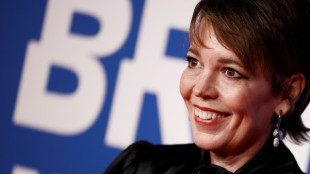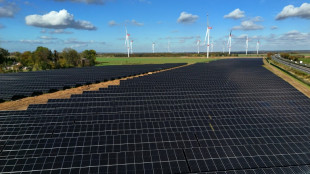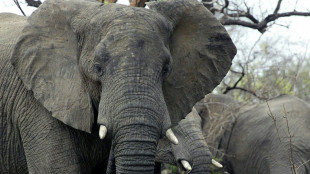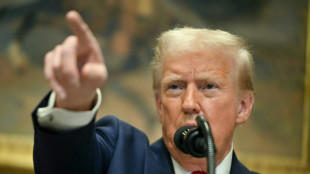
-
 Real Madrid break billion-euro revenue barrier to top Money League
Real Madrid break billion-euro revenue barrier to top Money League
-
Man City sign forward Marmoush from Eintracht Frankfurt

-
 WWF blasts Sweden, Finland over logging practices
WWF blasts Sweden, Finland over logging practices
-
How things stand in China-US trade tensions with Trump 2.0

-
 Most Asian markets rise after Wall Street's AI-fuelled rally
Most Asian markets rise after Wall Street's AI-fuelled rally
-
Colman to kick off Sundance as film world reels from LA fires

-
 Chief US diplomat vows 'unwavering support' for Israel
Chief US diplomat vows 'unwavering support' for Israel
-
Fire-hit Hollywood awaits Oscar nominees, with 'Emilia Perez' in front

-
 Nearly 200 Bangkok schools close over air pollution
Nearly 200 Bangkok schools close over air pollution
-
Daring attack pays off for Spain's Romo in Tour Down Under win

-
 Napoli host arch-rivals Juventus riding wave of Scudetto enthusiasm
Napoli host arch-rivals Juventus riding wave of Scudetto enthusiasm
-
Alpine skiing: Five things about the Kitzbuehel downhill

-
 J-pop star Nakai to retire after sex misconduct allegations: media
J-pop star Nakai to retire after sex misconduct allegations: media
-
New rider in town: Somalia's first woman equestrian turns heads

-
 Melbourne doubles feud as Kichenok accuses Mladenovic of 'direct threat'
Melbourne doubles feud as Kichenok accuses Mladenovic of 'direct threat'
-
Trump to take virtual centre stage in Davos

-
 Friedrich Merz: millionaire conservative on verge of German chancellery
Friedrich Merz: millionaire conservative on verge of German chancellery
-
Trump's return darkens mood as Germany heads to elections

-
 Pochettino happy after 'amazing' USA beat Costa Rica
Pochettino happy after 'amazing' USA beat Costa Rica
-
Most Asian markets extend AI-fuelled rally

-
 Bangladesh student revolutionaries' dreams dented by joblessness
Bangladesh student revolutionaries' dreams dented by joblessness
-
S. Korea investigators recommend Yoon be charged with insurrection, abuse of power

-
 Solar power surpasses coal in EU for first time
Solar power surpasses coal in EU for first time
-
Musk, Wikipedia founder in row over how to describe 'Nazi salute'

-
 Axel Rudakubana: troubled teen whose knife rampage shocked Britain
Axel Rudakubana: troubled teen whose knife rampage shocked Britain
-
Sasaki vows to 'give best' to fire-torn LA at Dodgers unveiling

-
 UK teen faces sentencing over murders that sparked riots
UK teen faces sentencing over murders that sparked riots
-
Larry Ellison, tech's original maverick, makes Trump era return

-
 Trump push to 'drill, baby, drill' may hit industry roadblock
Trump push to 'drill, baby, drill' may hit industry roadblock
-
Instagram courts TikTok stars during turbulent times

-
 Political crisis hits South Korea growth: central bank
Political crisis hits South Korea growth: central bank
-
Elephants are not people, US judges say

-
 Sinner aiming to be 'better, stronger' in Australian Open semi
Sinner aiming to be 'better, stronger' in Australian Open semi
-
Mass evacuations after explosive new fire erupts near Los Angeles

-
 Phoenix Motor Appoints Tony Zhou as Chief Technology Officer
Phoenix Motor Appoints Tony Zhou as Chief Technology Officer
-
Angle PLC Announces Trading Update

-
 The Now Corporation (OTC:NWPN) In Conjunction With Subsidiary Green Rain Solar Inc., Launch a Visionary Video Showcasing Solar Energy Solutions
The Now Corporation (OTC:NWPN) In Conjunction With Subsidiary Green Rain Solar Inc., Launch a Visionary Video Showcasing Solar Energy Solutions
-
Guardiola concedes Man City 'could not cope' with PSG as European hopes flicker

-
 PSG push Man City to brink with stunning Champions League comeback
PSG push Man City to brink with stunning Champions League comeback
-
Arteta wants sunshine break as Arsenal move towards last 16

-
 PSG comeback floors Man City as Arsenal near Champions League last 16
PSG comeback floors Man City as Arsenal near Champions League last 16
-
Trump toughens crackdown on immigration and diversity

-
 Celtic make 'little bit of history' with Champions League progress
Celtic make 'little bit of history' with Champions League progress
-
As Trump declares 'Gulf of America,' US enters name wars

-
 Celtic make Champions League progress thanks to Young Boys own goal
Celtic make Champions League progress thanks to Young Boys own goal
-
Trump's tariff threats are 'leverage,' says informal economic advisor

-
 Trump halts refugee arrivals in crackdown
Trump halts refugee arrivals in crackdown
-
Gangs could overrun Haiti capital if aid falls short: UN chief

-
 PSG sink Man City with stunning Champions League comeback
PSG sink Man City with stunning Champions League comeback
-
Leao sinks Girona and pushes Milan into Champions League top eight


Ukrainian pediatrician, beloved in Russia, pleads for children
When anxious parents in Ukraine and Russia need advice on a child's sore throat or upset stomach, they often turn to the same man -- pediatrician Yevgen Komarovskiy.
The hugely popular author and TV host has long been the go-to source on raising children for millions of parents in both countries and other ex-Soviet nations.
But now Komarovskiy dispenses a different kind of advice to his millions of social media followers: how to prepare infant formula from scratch, how to perform first aid, how to survive a rocket attack, how to administer iodine in case of nuclear contamination.
"Can you imagine what a mother feels when her child is sick and on an IV, and there are bombs exploding around them, and she needs to take her child with the IV to a bomb shelter?" Komarovskiy told AFP.
With salt-and-pepper hair and a thick moustache, Komarovskiy, 61, spoke by video call from an undisclosed location in his native Ukraine, with the national yellow-and-blue flag in the background.
His voice is one among many doctors and mothers in Ukraine telling harrowing tales of life under bombardment that underscore the toll Russia's war has taken on Ukrainian children.
In the two weeks since the invasion, Komarovskiy, who has two sons and three grandchildren, has been issuing emotional, angry pleas to Russian parents, exhorting them to take to the streets and protest the war.
"Don't give away your children," he wrote in a recent Instagram post. "And don't take away mine."
- Children caught up in horror -
More than 40 children have been killed and scores injured in the war, according to Ukrainian officials, with the latest outrage focused on an air strike that destroyed a pediatric and maternity hospital in city of Mariupol on Wednesday.
Over two million people have already fled Ukraine, many of them children, and millions more have been psychologically scarred.
"No disagreements between people, countries, politicians and states should be solved by bombing residential neighborhoods," Komarovskiy told AFP.
This week, the mayor of Mariupol said a six-year-old girl named Tanya died of dehydration under the rubble of a building destroyed by Russian shelling after her mother was killed.
"If somebody had told me that in the 21st century, practically in the middle of Europe we would see this pain, I wouldn't believe them," said Serhii Tsemashko, head doctor at Kyiv's Maternity Hospital No. 6.
"It used to be that when a woman gave birth, right away there were smiles and happiness, but today the happiness is diluted by pain, sorrow and fear," Tsemashko told AFP over video call, choking back tears.
Many of Tsemashko's patients now give birth in the basement of his clinic, while the operating room and all its equipment have been moved to a safer location inside the building.
Hospital staff sleep at the clinic, fearful they would be unable to return to work from home, while volunteers supply diapers, baby formula and food for patients and staff.
- Desperate race to hospital -
When Polina Chechet went into labor shortly after the war started, she knew she had to get to a hospital in Kyiv from her suburb of Irpin.
She required a C-section because of a medical condition, which left her with a dislocated pelvis and limited use of her right arm and leg.
Carrying a bag of belongings, and hugging her belly, she ran two miles to the nearest train station with her sister to catch the last train to Kyiv as rockets exploded in the distance.
Chechet made it to Hospital No. 6 and on February 25, the second day of the war, delivered a healthy girl, whom she named Elizaveta.
"I didn't cry when first I saw her," the 29-year-old brunette told AFP on a video call, as she cradled a sleeping Elizaveta.
"I cry when I see on TV how cities are being bombed, how people are being destroyed. What for? I didn't want this kind of future for my daughter."
Since Elizaveta was born, Chechet's hometown of Irpin on the northwest edge of Kyiv, has been devastated by Russian shelling and at least four civilians were killed trying to flee.
Komarovskiy says that -- if the war can be halted soon -- with time and help from mental health professionals, Ukrainian children will be able to recover from the trauma of war.
But to be happy, they need their parents by their side, he says.
"Modern medicine knows how to rehabilitate a child, how to revive and distract him," Komarovskiy said. "What it cannot do is bring back a dad who died at the front."
A.Clark--AT
